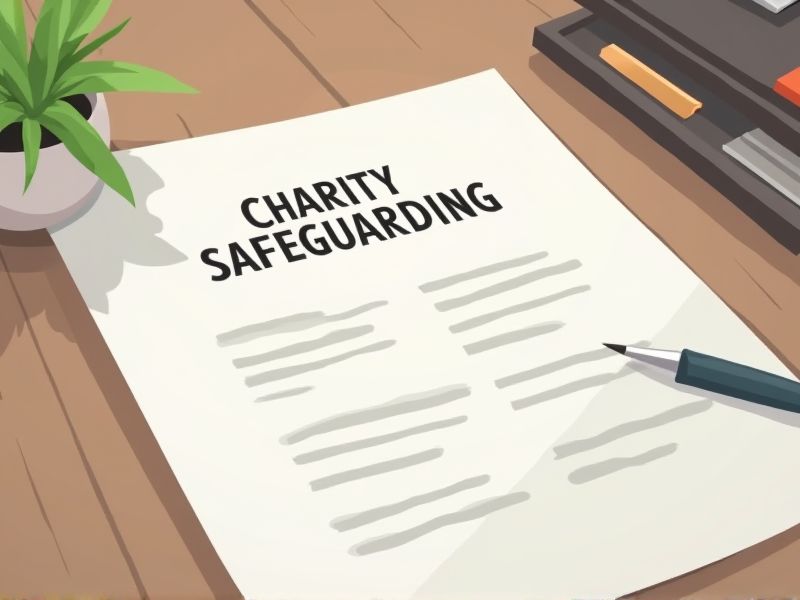
In the realm of charity work, safeguarding officers play a critical role in protecting vulnerable individuals. Due to the sensitive nature of their responsibilities, certain certifications ensure they have the requisite skills to manage complex situations effectively. These credentials not only enhance trust but also align the officers with legal and ethical standards. Key certifications to consider for a Charity Safeguarding Officer include the following.
Child Protection Training Certificate
A Child Protection Training Certificate equips charity safeguarding officers with the essential knowledge to identify signs of abuse and neglect, ensuring children are safeguarded effectively. Training enhances the officers' ability to implement appropriate intervention strategies, contributing to a safer environment for children. Possessing this certificate ensures that officers comply with legal and organizational standards, reducing the risk of liability. Comprehensive training fosters confidence and competence in engaging with vulnerable children and collaborating with other agencies.
Safeguarding Vulnerable Adults Certification
Safeguarding Vulnerable Adults Certification equips charity safeguarding officers with critical knowledge to identify abuse and neglect signs. This certification ensures adherence to legal frameworks and organizational policies that protect at-risk individuals. By obtaining this certification, officers demonstrate competence in creating safe environments for vulnerable adults within charity settings. Robust training through certification builds the necessary skills for handling and reporting safeguarding concerns effectively.
Mental Capacity Act Training Certificate
Charity safeguarding officers must obtain a Mental Capacity Act Training Certificate because it ensures they understand legal responsibilities when supporting individuals with impaired decision-making abilities. This expertise protects both the individuals and the organization from potential legal issues. Staff trained in the Mental Capacity Act can make informed decisions that respect the rights and dignity of those they support. Reinforcing safeguarding efforts, the certification also enhances trust and credibility with stakeholders and beneficiaries.
Prevent Duty Awareness Training Certificate
Prevent Duty Awareness Training Certificate equips Charity safeguarding officers with vital knowledge to identify individuals at risk of radicalization. This training enhances their ability to act confidently and appropriately, ensuring compliance with legal obligations. As a result, it strengthens safeguarding policies, maintaining a secure environment for beneficiaries and staff. Continuous learning through such certifications fosters a proactive culture against extremism within organizations.
Risk Assessment and Management Certification
Charity safeguarding officers deal with vulnerable populations, and inadequate risk assessment can lead to potential harm, necessitating certification for enhanced protection. Certification programs equip officers with standardized procedures to identify and manage risks effectively, crucial for safeguarding missions. Understanding legal and ethical responsibilities through certification helps mitigate liabilities and ensures compliance with regulatory requirements. The dynamic nature of risks in charitable environments requires continuous education, which certification can systematically provide.
Data Protection and Confidentiality Certificate
A Data Protection and Confidentiality Certificate ensures a Charity Safeguarding Officer understands legal obligations to protect sensitive donor and beneficiary information. This knowledge reduces the risk of data breaches, which can damage the organization's reputation and trust with stakeholders. Compliance with data protection laws such as GDPR helps prevent potential fines and legal issues. Ensuring confidentiality fosters a secure environment for victims of abuse to come forward without fear of their information being mishandled.
Equality, Diversity, and Inclusion Training Certification
Charity safeguarding officers handle vulnerable populations and diverse communities, requiring a nuanced understanding of varying cultural, social, and personal contexts, which equality, diversity, and inclusion (EDI) training provides. Without EDI certification, safeguarding officers might unintentionally perpetuate biases, undermining the trust and safety essential in charitable work. The training equips officers to recognize and mitigate discrimination, fostering more inclusive environments for both beneficiaries and staff. As regulatory standards increasingly prioritize inclusivity, certification ensures that a charity remains compliant and forward-thinking in its approach.
Incident Reporting and Investigation Certification
Incident Reporting and Investigation Certification provides charity safeguarding officers with the necessary skills to identify and respond to potential risks effectively. When equipped with this certification, officers enhance their ability to document and analyze incidents, which supports compliance with legal and organizational standards. This training ensures a structured approach to investigations, reducing the likelihood of oversight in safeguarding processes. By formalizing incident handling, the charity's overall risk management strategy is strengthened, fostering a safer environment for beneficiaries and staff.
Ethical Governance and Compliance Certification
Ethical Governance and Compliance Certification ensures that charity safeguarding officers are equipped to protect vulnerable individuals, thus reducing incidents of misconduct. With proper certification, officers gain comprehensive knowledge of legal and ethical standards, leading to more effective safeguarding protocols. Certification enhances public trust in charities, increasing support and donations as stakeholders are assured of ethical operations. Trained officers in ethical standards reduce risks of legal liabilities and reputation damage, ensuring the sustainability of charitable organizations.
First Aid and Emergency Response Certification
Charity safeguarding officers often deal with vulnerable populations, increasing the likelihood of encountering medical emergencies. Holding a First Aid and Emergency Response Certification equips them with essential skills to manage health crises promptly and efficiently. Timely intervention in emergencies can significantly enhance the safety and well-being of individuals in charity settings. Certification reinforces the officer's competency, building trust among beneficiaries and enhancing the organization's reputation.
Summary
By obtaining certifications, you enhance your capability to ensure a safer environment in the charity sector. This leads to increased trust from stakeholders, given your demonstrable expertise in safeguarding. You can expect improved risk management and better protection for vulnerable individuals in charitable activities. Certifications also strengthen your credibility and broaden your professional development opportunities.
